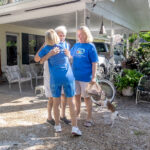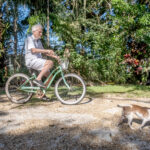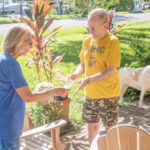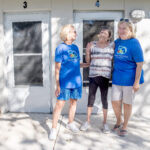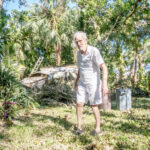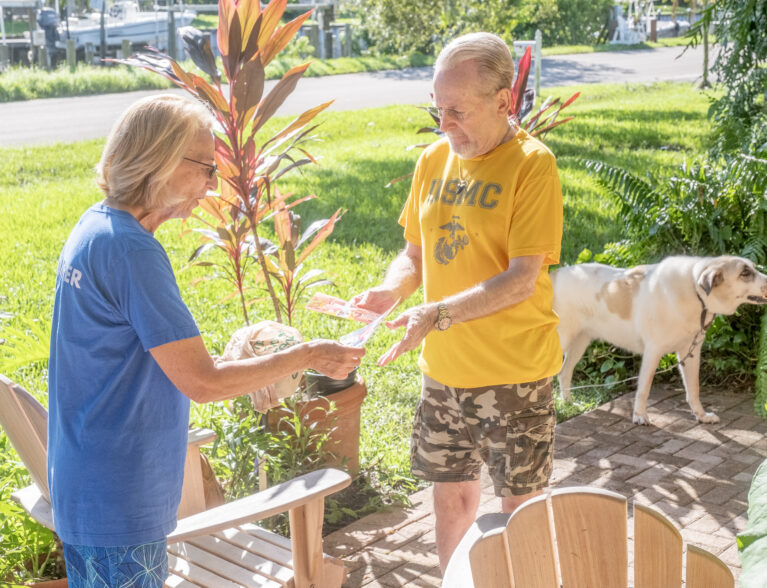
Meals on Wheels volunteers may have been the last visitors to see hundreds of local senior citizens before last week’s tornadoes hit Vero Beach – and then the first to show up after the Hurricane Milton ‘all-clear’ sounded.
Before the winds and rain started, they dropped off extra meals and information about shelters and other resources. Afterward, they checked on homebound clients, walked around back yards to see damage, and sometimes just listened – or dispensed hugs.
Randy Miller operated a gas station before he retired, and he used to call Bingo and volunteer. Now he’s visually impaired and can’t drive, but he and his dog Dottie still look forward to visits from his Meals on Wheels delivery volunteers.
“I heard a big roaring noise, I said what is that?” Miller said, describing the tornado that hit his Vero Beach neighborhood. “This yard (had) 30-foot trees l down. I spent four days clearing this yard.”
Miller needed help on Monday starting his washing machine to catch up on laundry after the power came back on. His volunteer driver gladly obliged.
David Risinger was also in one piece, his home of 35 years unharmed after the storm, but he felt bad for his caregiver.
“Her house was fine, but it obliterated her prayer garden,” he said of the woman he depends on daily due to a stroke.
Homebound seniors are a demographic of residents that many don’t think about in times of crisis. But for the staff and volunteers at the Senior Resources Association (SRA), those oft-forgotten local residents are their top priority.
“There’s a lot that goes on behind the scenes to make sure that everybody is OK,” said Erin Miller, SRA’s Director of Communications and Media Relations.
In fact, the SRA began prepping for the possible arrival of potentially dangerous storms back in June. For each of the past two years, Florida Power & Light has donated shelf-stable meal kits to Meals on Wheels programs across Florida. The local program received 900 meal kits from FPL. The SRA then doubled that amount by purchasing 900 additional kits.
Each meal kit contains one breakfast, one lunch and one dinner, including things like juice boxes, bottled water, pouches of chicken, canned pasta, cereal, powdered milk, crackers, applesauce and cookies.
With around 540 Meals on Wheels clients, plus another 65 or so who come in to eat at five social dining sites, the supply was enough for three shelf-stable meal kits for each client. The first batch of meal kits was distributed in June at the beginning of hurricane season. The rest were distributed on Monday, Oct. 7, along with a hot meal and portable chargers for phones. On Oct. 8, clients received their regular hot meals, plus two frozen meals for Wednesday and Thursday.
That was enough to get them through the storm and the weekend, with volunteers returning to their daily Monday through Friday deliveries on Oct. 14. During and after the storm, SRA staff made wellness calls each day to each client to make sure they were OK.
Starting in 2024, the Indian River County Hospital District has been granting the Senior Resource Association $1.4 million. A little over $1 million helps fund the Meals on Wheels program, with the remainder going to support SRA’s Guardianship program, which advocates for indigent adults who have been deemed incapacitated by the courts, helping them manage their personal and financial decisions.
“I’ve been doing this for 18 years,” said Karen Deigl, president and CEO of the SRA. “At any given time we’ve had 150-200 people on a waiting list for services. Thanks to the Hospital District, we are now able to feed everyone on the wait list. That’s exciting.”
Residents who don’t qualify for free meals can sign up for Meals on Wheels for themselves or for a parent, to make sure they get hot meals all week and nutritional frozen meals for the weekends.
Photos by Joshua Kodis
- Senior Resource volunteers Laurie Wykoff and Linda Triolo give Meals on Wheels client Randy Miller a hug while they deliver his food.
- Randy Miller shows off how he’s still able to get around on his old rusty bicycle.
- Laurie Wykoff delivers food to Meals on Wheels client David Risinger.
- Laurie Wykoff, Kristine Carpenter, and Linda Triolo.
- Randy Miller in front of his shed that was destroyed during the storm.
Staff photographer Joshua Kodis contributed to this report.

